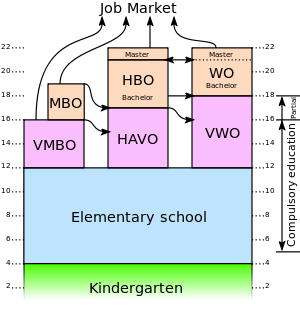Language/Dutch/Culture/Education
So within the Netherlands we have an Education system that is quite different than most countries, which is why I hope that this piece will give you somewhat of an understanding about our system :)
The Dutch education system is characterized by division, as it caters for the different needs of learning for different pupils. Education is compulsary in the Netherlands from the age of 5 till 18, although most people start with primary school the day after they turn 4.
Within your Dutch education, you will go through kindergarden (most kids anyway) (peuterspeelzaal), primary school (basisschool), high school (middelbare school/voortgezet onderwijs) and usually some form of high education (hoger onderwijs).
Basisschool (Primary School)
You go to primary school from the age of 4 till 12, which is divided in 8 groups based on age. Dutch kids in school usually don´t get any homework in primary school that they have to make at home. Furthermore, there is one final test in the last class of primary school that gives an indication of the intelligence of the student (which is needed to assess which level of high school the kid will go to). However, this test is an advise, and the teacher will in the end decide which level would be appropriate for the pupil.
Voortgezet Onderwijs (Secondary Education)
Secondary education in the Netherlands compiles both middle school and high school in English countries. The system in the Netherlands makes a division between different needs of learners, based on the "ease of learning" of students. Depending on the level you are in, you will be in high school from 12-16, 12-17 or 12-18.
The levels can generally be divided into three sections (some sections have multiple sublevels but that is really going into details)
- VMBO: The abbrevation stands for "voortgezet middelbaar beroepsonderwijs" (pre-vocational secondary education), which is the lowest level of the three and is basically a prep school for vocational secondary Dutch education (middelbaar beroepsonderwijs MBO). It takes 4 years, so from the age of 12-16
- HAVO: The abbrevation stands for "hoger algemeen voortgezet onderwijs" (senior general secondary education), which is the middle level of the three. It takes 5 years, so from the age of 12-17. It provides entrance to higher professional education (hoger beroepsonderwijs HBO) at ‘vocational universities’.
- VWO: The abbrevation stands for "voortgezet wetenschappelijk onderwijs" (scientific secondary education), which is the highest level and will prep you for academic studies at research universities.
In all levels, English is a compulsory course that everybody has to take. The same goes for Dutch and Physical Education.
Hoger Onderwijs (Higher Education)
Like the secondary education, the higher education in the Netherlands is divided in three main sections.
- MBO: Stands for "middelbaar beroepsonderwijs", (vocational education), which you can directly enter from VMBO, or any higher levels. It has a big focus on practical learning in the classroom with hands-on training. After completing you can go onto the job market, or (depending on the level of MBO) can go to HBO.
- HBO: Stands for "hoger beroepsonderwijs" (higher vocational education), which you can directly enter from HAVO. It is also known as a "University of Applied Sciences". You can follow practical-based programs that take four years, after which you can choose to go to the job market or do a master.
- WO/Universiteit: Stands for "wetenschappelijk onderwijs" (scientific education or university) and is otherwise known as a "Research University". There are 13 universities in the Netherlands which are all ranked in the top 200 of Times Higher Education´s World University Rankings, from which eight can be found in the top 100 universities in the world. A bachelor takes usually 3 years, after which most students proceed to do their masters.

